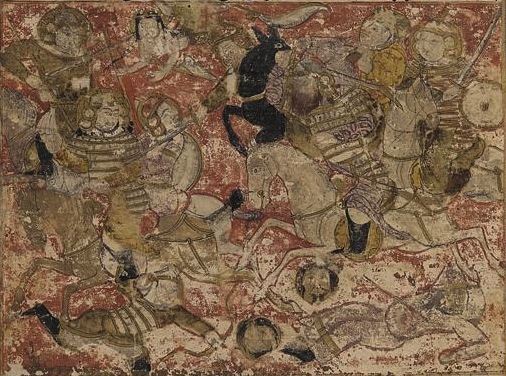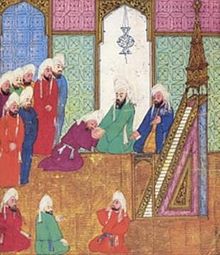
From the beginning of the middle of the last century, Islamists and advocates of political Islam have come out with dreams of returning to the state of their ancient colonial caliphate, and they took advantage of the backwardness of Arabic-speaking countries vis-à-vis world cultures, claiming that the reason for our backwardness is our having distanced ourselves from the law of God and due to the secular systems that govern us.
IT IS AS IF EUROPE, when its civilization emerged, one that had no parallel in history, breathed its culture of progress and prosperity in adherence to some ancient law. But our homelands did not for a single day go through any similar experience of secularism and we in fact fell victim to the beckoning of military or clerical regimes.vis-à-vis
We will not talk here about the achievements of the secular system throughout the world or in the developed countries, achievements hidden to no one with any insight. What we want to address here is the Islamic project that they sometimes threaten us with over mosque loudspeakers or at other times with bullets. Despite the clamour of their loudspeakers and the sound of their bullets, these have not yet presented a real political model suitable either to adopt or reject, since most of their speech is emotional, and plays on the religious and sectarian feelings of ordinary folk. Since they have not presented us with any real model of that distorted project they are calling for, we will assume ourselves that task to see if political Islam can actually present any real project suitable as a system of government.
Despite the clamour of their loudspeakers and the sound of their bullets, these have not yet presented a real political model
Islam and the system of government
Despite repeated calls by advocates of Islamisation for the application of Islamic rule, the most basic thing that any political theory should offer is a system of government: who is to govern it and how this should be done. But in Islam we do not find any such thing. Had it existed the Companions of the Prophet Muḥammad would not have fallen into dispute about this among themselves merely hours following his death and while he was yet to be buried in the Saqīfat Banī Sā‘ida[i]. The dispute between the Muhājirūn and the Anṣār and the refusal of ‘Alī to pledge allegiance to Abū Bakr al-Ṣiddīq continued to the point that Zubayr threatened him, saying: “I will not sheathe back my sword unless ‘Alī pledges his allegiance!”[ii] But ‘Alī did not pledge allegiance to Abū Bakr until 6 months into his caliphate[iii]when ‘Āisha, Ṭalḥa and Zubayr raised their swords against ‘Alī ibn Abī Ṭālib at the Battle of the Camel. A repeat performance of this took place later but this time between Mu‘āwiya and ‘Alī ibn Abī Ṭālib in the Battle of Ṣiffīn. The upshot of those two battles was the death of more than a hundred thousand, all of them Companions and Followers.[iv]
If there had been a real system of government in Islam, the early Muslims would not have endured those fierce battles and civil wars
If there had been a real system of government in Islam, the early Muslims would not have endured those fierce battles and civil wars. It was not clear to them who was the ruler and through what mechanism. Accordingly the sword and conflict became the mechanism: Abū Bakr took the caliphate after a pledge of allegiance, as we mentioned, then ‘Umar ibn al-Khaṭṭāb assumed the caliphate on the recommendation of Abū Bakr.[v] Then allegiance was pledged to ‘Uthmān for the caliphate, which ‘Alī viewed as a grand act of deception.[vi] Subsequently ‘Alī ibn Abī Ṭālib assumed the caliphate by an act of arbitration between him and Mu‘āwiya after the Battle of Ṣiffīn.[vii] Mu‘āwiya then assumed the caliphate with a concession from Ḥasan, following which Mu‘āwiya arranged for it to pass to his own son by succession and the office then became hereditary.
The question we want to ask here is: how the ‘Islamic project’ propose to choose the ruler? Is it through pledging allegiance, through recommendation, arbitration or is it to be a hereditary office? Or will it appeal to infidel Western democracy when it comes to it? Does this not prove the failure of the system they are calling for? It has failed even to provide the most basic element offered by any system of government.
We would like to ask what the basis is upon which the state will be founded.
The constitution of the state
Since they claim that their project is a comprehensive one we would like to ask what the basis is upon which the state will be founded. Naturally the constitution will not be a constitution in its secular sense – a social contract between the ruler and the governed to organize society. But their answer is a ready-made slogan, the repetition of ‘Our constitution is the Qur’ān’. Yet is the Qur’ān really suitable to be a constitution for the establishment of a state? Can a constitution carry many faces, as ‘Alī ibn Abī Ṭālib said about the Qur’ān:
Do not argue with them by the Qur’ān because the Qur’ān has many faces. You would say your own and they would say their own: but argue with them by the Sunna, because they cannot find escape from it.[viii]

Suggested Reading
Is it permissible for the foundation of the state to be open to interpretation and differences in interpretation between various people and interpreters? Is there a constitution in the world that is subjected to interpretation in thousands of volumes that differ among themselves about how it is to be understood? If the Caliph ‘Alī, the cousin of the Prophet Muḥammad himself, refused to resort to the Qur’ān between himself and the Kharijites since it ‘has many faces’, are we to appeal to it for the foundation of our state?
[i] The discussions at Saqīfat Banī Sā‘ida concerned the succession to the Prophet following his death, and as a result of which Abū Bakr was nominated his successor or khalīfa (‘caliph’). The conflict was between on the one hand the Muhājirīn and the Anṣār,(See Glossary on these terms) and on the other hand between the family of the Prophet and a number of the major Companions. The issue was over whether the rules had to be from the tribe of Quraysh, in that “people would only obey this class of the Arabs.” The incident stands at the heart of the Sunnī-Shīa divide, in that ‘Alī based his claim on an alleged explicit pronouncement of Muḥammad on the occasion of the Prophet’s ‘Farewell Sermon’ at Ghadīr Khumm.
[ii] Ibn Kathīr, الكامل في التاريخ Vol 2, p.325.
[iii] Op. cit.
[iv] See Glossary: ‘Tābi‘ī’.
[v] Ibn Kathīr, بداية ونهاية .
[vi] Op. cit.
[vii] Ibn ‘Arabī, العواصم من القواصم p.172.
[viii] Nahj al-Balāgha, Letter no. 77. (Ed).
The pledge of allegiance made to Abū Bakr at Saqifat Bani Sa’ida, from a Persian miniature, c.1595.
Main image: The battle of Ṣiffīn as depicted in a 14th century MSS of Tārīkhnāma-yi Bozorg (‘Great History’)

